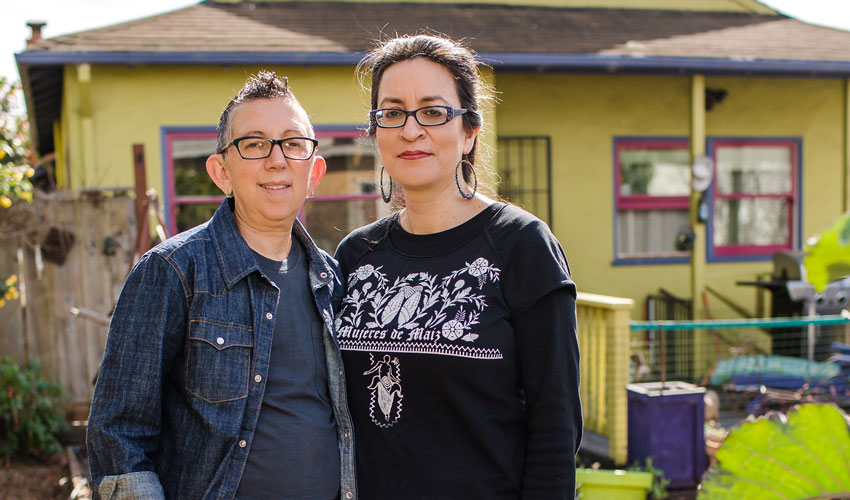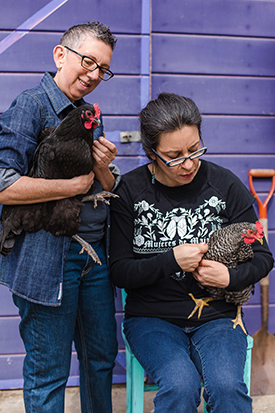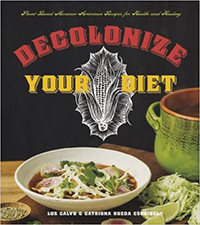Finding health and heritage in natural, traditional foods

Luz Calvo (left) and Catriona Esquibel advocate a return to a traditional Mexican, plant-based diet in their forthcoming book, "Decolonize Your Diet: Plant-Based Mexican-American Recipes for Health and Healing." (Photo by Miki Vargas)
Cooking a pot of beans is a revolutionary act.
So say Catriona Rueda Esquibel and Luz Calvo -- scholars, urban farmers, passionate home cooks and authors of the website and recently published cookbook "Decolonize Your Diet: Plant-Based Mexican-American Recipes for Health and Healing."
"As Latinos and Mexican Americans, cooking is a part of our heritage that hasn’t been valued," said Esquibel, associate professor of race and resistance studies at SF State. "We have this traditional knowledge, this tradition of health, and we want to recognize and value that. Making a pot of beans, a tradition that is so nourishing, is one way to do that."

Calvo and Esquibel raise chickens on their urban farm in Fruitvale. (Photo by Miki Vargas)
Esquibel and Calvo advocate a diet based on the indigenous plants that their Mexican ancestors ate hundreds of years ago. On their small urban farm in Fruitvale, where they live with chihuahuas Sweet Pea and Nopalito (who is, fittingly, named after a type of cactus commonly used in Mexican cooking), the couple grows a variety of fruits, vegetables and herbs -- including historic staples that have fallen out of common use, such as purslane and lamb's quarter. They raise chickens for their eggs and prepare recipes passed down by family members, adapted from cookbooks or discovered through research into historical practices.
The pair decided to share their way of eating, starting small and eventually growing their Facebook community to more than 12,000 members and authoring "Decolonize," which contains more than 120 "recipes to sustain revolutionary love." Dishes include Huaraches de Nopal, which employs the paddle of a Mexican cactus in place of a tortilla base. Hibiscus Flower Power Tacos get their "meaty texture" ("believe it or not," the recipe says) from dried hibiscus flowers.
But the "Decolonize" diet is about more than healthy eating. Esquibel and Calvo are passionate in their belief that Latinos in the United States should embrace their culture's culinary roots as a form of "food justice."
"Mexican food is viewed in the United States as this kind of fast-food interpretation, everything fried and covered with sour cream and cheese, and none of that is traditionally Mexican," Esquibel said. "If you look up Wikipedia on tamales, it says, 'Tamales are traditionally made with beef or pork.' Well, for the last 500 years they may have been made with beef or pork, but tamales have been made for thousands of years with lots of other things, including rabbit, fish, eggs, amaranth, all these different ingredients, and that has been forgotten."
Calvo and Esquibel want Mexican cuisine to be acknowledged as being as longstanding and as healthy as other traditional diets, such as the Mediterranean diet, which is often referenced as a font of health.

"There's an idea that public health programs have to teach Latinos how to eat, that we have health problems because we don't know how to eat," Esquibel said. "It's not that we don't know how to eat; it's that the system is set up so there are no grocery stores, no fresh produce available, or our traditions are not valued."
It's also important to prioritize the act of cooking, Calvo explained. "We're bombarded with advertisements for fast food and processed food, the idea that you can do more important things than cook," Calvo said. "So our work is about reclaiming the act of cooking as a political act of refusal."
Given the current climate of concern about the American diet and its negative health and environmental impacts, Calvo said the timing is particularly ripe for the way of eating they advocate to be embraced.
"It feels like it's a moment in history when people are open and interested in this idea," Calvo said. "But there is so much more work to do. Our immigrant communities have indigenous knowledge that has been passed down from generation to generation, knowing how to eat healthy with very few resources. They don't need our book. It's the next generation, our students' generation, that needs our book."
Learn more about the "Decolonize Your Diet" lifestyle and find dozens of recipes on Calvo and Esquibel's Facebook page and blog. "Decolonize Your Diet" was published Oct. 1 by Arsenal Pulp Press.